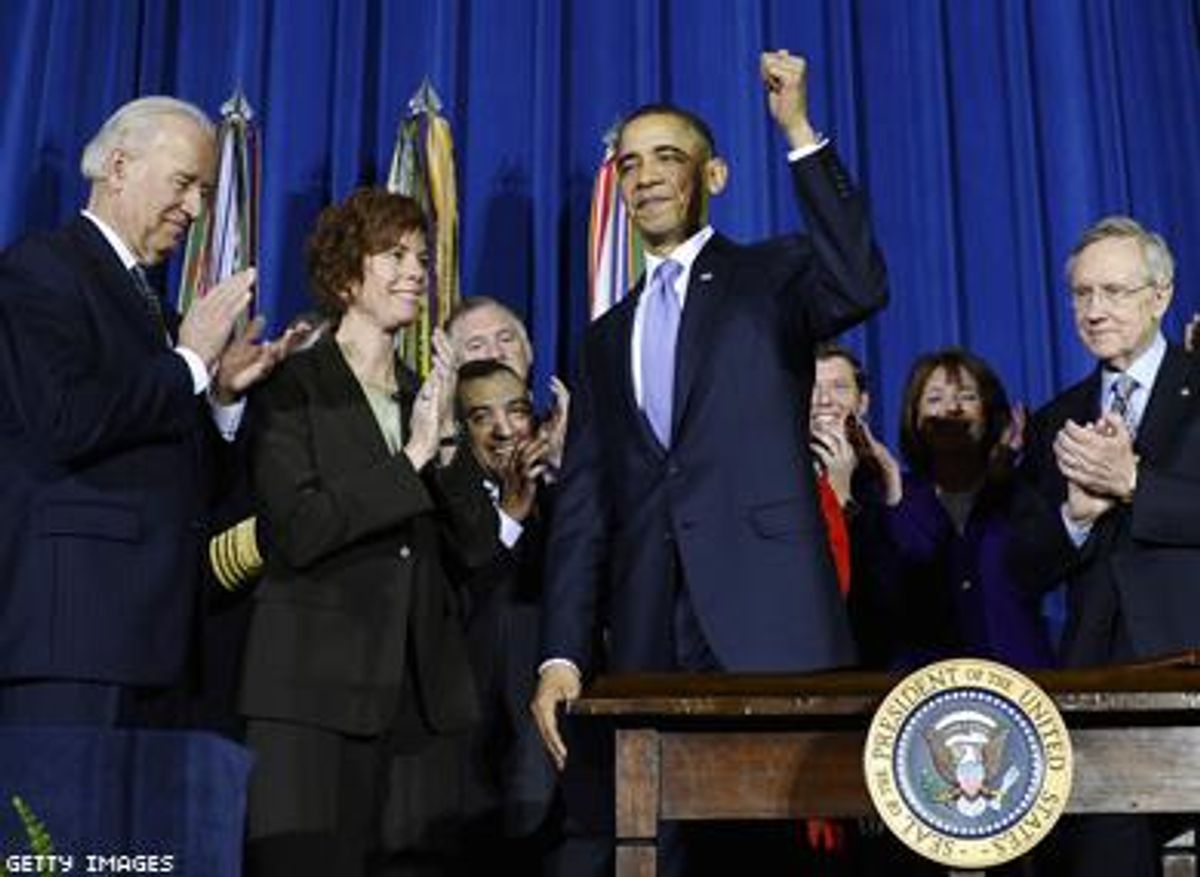Voices
Op-ed: One Pivotal Year for a Soldier Seeking Equality
Op-ed: One Pivotal Year for a Soldier Seeking Equality

By continuing to use our site, you agree to our Private Policy and Terms of Use.
Op-ed: One Pivotal Year for a Soldier Seeking Equality
Op-ed: One Pivotal Year for a Soldier Seeking Equality

When I was deployed with the Army to Iraq just before the holidays last year, I was full of uncertainty. Any time service members get deployed, they give up a lot. For me, one of the first sacrifices I had to make was spending Christmas without my family. But just a few days before Christmas last year, I picked up a newspaper and read that President Obama had signed the repeal of "don't ask, don't tell." For a soldier worried about how I would be able to live in Iraq for a year and hide who I was 24/7, it was the best Christmas present I could have received.
It would be another nine months before the repeal took effect, but knowing that it was on the way, I came home for a two-week R&R in May 2011 and married my best friend and partner, Joshua. We traveled from our home in Columbus, Ohio to Washington, D.C. in order to be married at the grave of Leonard Matlovich, who had been the first to publicly fight his discharge from the armed forces for being gay. He was a pioneer for gay rights, and, for us, it was an appropriate way to honor his legacy and celebrate our lifelong commitment to one another.
When my time at home was up, I went back to my post in Iraq, anxiously awaiting the date of the repeal. We kept hearing that the reason it was taking so long was the military needed to ensure it didn't affect the morale of the troops who were deployed. That's when I fully realized how invisible we were as gay and lesbian patriots, protecting the rights of Americans that we couldn't even ourselves enjoy. There I was, deployed to help secure freedom for the Iraqi people and bring a safe end to the conflict. "What about my morale?" I remember thinking.
But finally, certification as outlined by the repeal law, was made by the President, Secretary of Defense, and Chairman of the Joint Chiefs. We suddenly had a date: September 20. I have been in the military for more than 20 years, and it was a day I had thought about for a long time. I had always hoped to one day be able to serve the country I love openly, to not be forced to hide pictures of my spouse or make up false names and false stories about what I did last weekend.
But as the date came closer and my anticipation grew, I also started hearing some Republican presidential candidates say they would work to reverse the repeal. I could see my own freedom in my grip -- the same freedom for which I have fought for 20 years -- but it was being threatened by politicians who I don't believe understand why repeal is so important in the first place.
So, when the opportunity came in September to ask the candidates a question via YouTube during a debate sponsored by Google and Fox News, I used it to ask them about repeal. That moment got a lot of national attention because a number of audience members booed after they heard the question.
What you probably don't know is that there was a second part to my question, and it was about whether these candidates would support repealing laws, including the so-called Defense of Marriage Act, that prevent my husband Josh and me from receiving the same benefits as all other military families. This includes health care, housing, and survivors' benefits.
But after I heard their answers on the repeal of DADT, I knew where they stood on benefits. They didn't even have to answer it. I also knew that if Josh and I could not count entirely on the political process to ensure fairness and equality for our new family, we would also have to turn to the legal process.
So, while I was still deployed to Iraq, Josh and I joined seven other couples in a federal lawsuit brought on our behalf by Servicemembers Legal Defense Network and co-counseled by the law firm Charbourne & Parke. That suit seeks the same recognition, support, and benefits for all military families, regardless of sexual orientation. We don't know where it will end up, but if we can play a small part in helping to pave the way for other families like ours, we feel obligated to do so.
Just a few weeks ago, I returned home to Ohio from my deployment, and I have had some time to reflect on this past year -- from the president signing repeal legislation, to marrying the love of my life, to being able to serve openly as a gay man in the U.S. Army for the first time.
And indeed, the year has brought with it many lessons. It has taught me that sometimes we have to fight for what we believe in, even if it means taking risks. It has reminded me that my family and I deserve the same treatment, respect, and rights as all other military families. And it has reinforced for me why I joined the military in the first place -- to be a soldier.
When repeal of DADT came on that day in September, I got up and went to breakfast. I went through my workday just as I have for the past 20 years. But for the first time, I did not have to worry that someone could take away the job I love and the career I have earned just because I choose to be honest about who I am. I was the same soldier as on the day before, and that is the soldier I will continue to be until I retire -- a soldier committed to the mission of keeping America safe and secure, for my family and for yours.
CAPT. STEPHEN HILL is an Army reservist with more than 20 years of service who recently returned from active duty deployment in Iraq. He is married to Joshua Snyder, and they reside in Columbus, Ohio, where Hill is the director of the Columbus Public Health WIC Program for Franklin County. Hill recently drew national interest when he submitted a video via YouTube that was used during the Fox News/Google Republican Presidential Debate in September to question the candidates about the repeal of "don't ask, don't tell." He and his husband are plaintiffs in the case, McLaughlin v. U.S.
Want more breaking equality news & trending entertainment stories?
Check out our NEW 24/7 streaming service: the Advocate Channel!
Download the Advocate Channel App for your mobile phone and your favorite streaming device!

